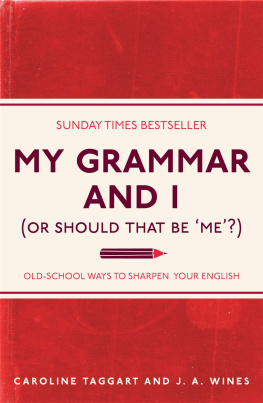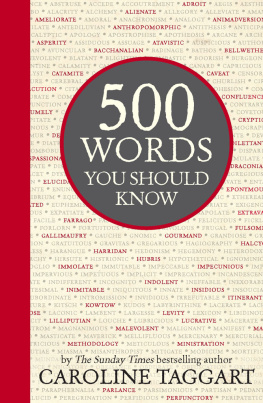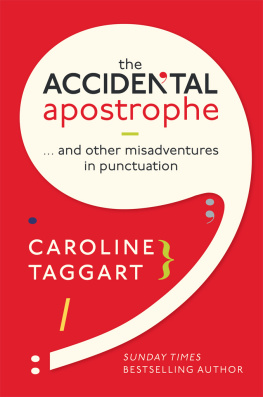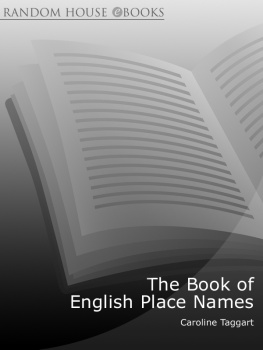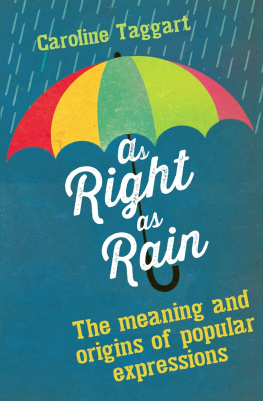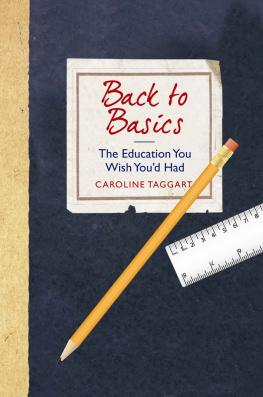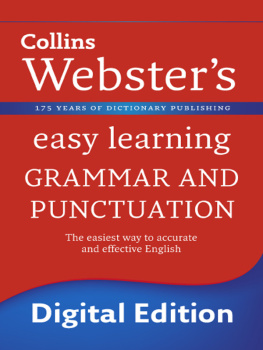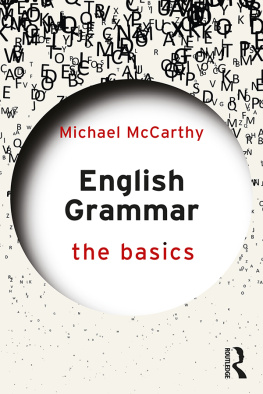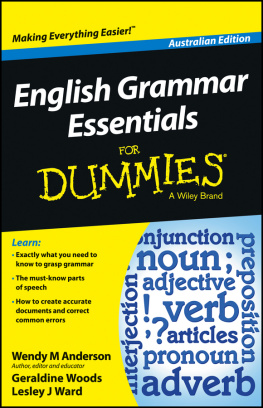
Caroline Taggart is a freelance writer and editor. She is the editor and spokesperson for Writers Market UK, an annual guide for aspiring writers, and also enjoyed (immensely) a stint as a bestselling author following the publication of I Used to Know That: Stuff You Forgot from School.
J. A. Wines is a freelance writer, compiler and editor. Her other works include The Book of Garden Games, Dogs Miscellany and, most recently, Mondegreens: A Book of Mishearings.
First published in Great Britain in 2008 by
Michael OMara Books Limited
9 Lion Yard
Tremadoc Road
London SW4 7NQ
This electronic edition published in 2011
ISBN: 978-1-84317-626-8 in EPub format
ISBN: 978-1-84317-528-5 in Mobipocket format
ISBN: 978-1-84317-310-6 in hardback print format
ISBN: 978-1-84317-657-2 in paperback print format
Copyright Michael OMara Books Limited 2008
All rights reserved. You may not copy, store, distribute, transmit, reproduce or otherwise make available this publication (or any part of it) in any form, or by any means (electronic, digital, optical, mechanical, photocopying, recording or otherwise), without the prior written permission of the publisher. Any person who does any unauthorized act in relation to this publication may be liable to criminal prosecution and civil claims for damages.
A CIP catalogue record for this book is available from the British Library.
Cover design, text design and typesetting by Glen Saville
Front-cover lettering by Toby Buchan
www.mombooks.com
CONTENTS
ABC: Easy as 123 (or, Spelling)
That which comes before (or, Prefixes)
Happy endings (or, Suffixes)
Thats capital (or, Capitalization)
Countdown (or, Vowels and consonants)
Say what? (or, Parts of speech)
Definitely indefinite (or, Articles)
Demonstrate your determination (or, Determiners)
Whats in a name? (or, Nouns)
One die, two dice (or, Singular and plural)
Thou and thee (or, Pronouns)
What a to-do (or, Verbs)
Kind of funny-looking (or, Adjectives)
Reverently, discreetly, advisedly, soberly (or, Adverbs)
Dangly bits (or, Misplaced modifiers)
May I compare thee to a summers day? (or, Comparatives)
And now well move on (or, Conjunctions)
Its behind you! (or, Prepositions)
Holy moly! (or, Interjections)
Do I get time off for good behaviour? (or, Sentences)
Subject Verb Object
On the subject of I and the object of me (or, Subject and object)
Dont you agree? (or, Agreement)
From major to minor (or, Clauses)
How do you phrase that? (or, Phrases)
Stop! (or, Full stops)
Take a deep breath (or, Commas)
What is this, the Spanish Inquisition? (or, Question marks)
Something to shout about (or, Exclamation marks)
Two pricks (or, Colons)
Supercomma to the rescue (or, Semicolons)
Dash it all! (or, Dashes)
Joined-up writing (or, Hyphens)
Quotation marks
Whats all the fuss? (or, Apostrophes)
Whats not in a name? (or, Possessive apostrophes)
Being a bit fancy
A big no-no (or, Double negatives)
Pleonasm, prolixity and tautology (or, Wordiness)
Bibliography
A CKNOWLEDGEMENTS
Thanks to Silvia for sillinesses; to Glen for making sense of it all; to Cec, who knows more about this subject than Calvin Coolidge put together; and to everyone who valiantly stayed conscious while we tried to discuss grammar with them.
I NTRODUCTION :
A VERY BRIEF HISTORY OF E NGLISH GRAMMAR
[It is] impossible at the present juncture to teach English grammar in the schools for the simple reason that no one knows exactly what it is.
G OVERNMENT REPORT , 1921
Anyone who has so much as run their eye over an Anglo-Saxon lament, a tale by Chaucer or a play by Shakespeare will see that the English in which they are written is very different from the way we write and speak today. Even a novel written as little as fifty years ago may differ from a modern one in style, vocabulary and punctuation. The books of poor old Enid Blyton, most of which were written in the 1940s and 1950s, have already had to be revised for modern children because they were considered so out of touch and not least because she had a propensity for naming her characters Fanny, Dick and so on.
It is in the nature of a living language to evolve, as new inventions require new words, foreign influences enliven the vocabulary and social changes give people more or less leisure to write at length. The monks who copied out medieval texts invented short forms to save themselves time, which passed into the language as ligatures in words such as, funnily enough, medival, which we now deem archaic. In our own time the great revolutions have occurred because of emailing and texting, and who knows: a standard dictionary of 2028 may well contain the word gr8.
Rules were very much in the minds of the sticklers of the eighteenth century, who, fearing for the health of the English language, decided to impose on it a grammar system that would fix it good and proper. Unfortunately for us, these scholars were specialists in Ancient Greek and Latin not German, the language from which English is derived so they imposed an awful lot of Latin rules that didnt fit too comfortably with English, thereby creating all manner of unnecessary complications. Most English people couldnt even speak Latin, let alone master its grammar.
Ignoring this major flaw in the plan, in 1762, an Oxford professor called Robert Lowth produced a prescriptive text titled A Short Introduction to English Grammar, a publication so influential that it dominated grammar teaching into the twentieth century (and indeed is much quoted in this book). No longer did one dare to end a sentence with a preposition, to split an infinitive or to say between you and I.
Lowths rules aside, the majority of people would have had little knowledge of English grammar until the end of the nineteenth century. Most of them couldnt read or write, never mind worry about un-splitting infinitives. It was not until the late 1800s that schooling became compulsory and children were sent off to learn how not to blot their copybook.
Swots Corner: The earliest grammar systems we know of were in Iron Age India, about the fifth century BC. The Greeks had a grammar system by 100 BC, and the Romans created a Latin grammar system following the Greek example. Some 272 grammars of English were published before the eighteenth century.
Grammar teaching was regarded as important until the early 1960s, when the authorities decided that we did not need to be drilled in a language we could already speak, and pretty much everyone decided that Latin was boring and pointless. Thirty years later, however, businesses and universities began to complain about the younger generations bad grammar and punctuation, with the result that the subject was once again taken seriously and reappeared on school syllabuses. But, like maths, it remains a subject that many of us regard with foreboding. Either you belong to the generation that missed out on grammar when its teaching was out of fashion; or, if you are older or younger than that, youll have hazy recollections of rules that you perhaps only half understood in the first place.
Swots Corner: When grammar became a required subject in many US schools in the mid-nineteenth century, teachers complained that they knew no more about it than their pupils.
This book aims to fill in some of the gaps that the education system may have left you with, but remember that English is a rich and fluid language and that one persons unbreakable rule is another persons insufferable pedantry. Knowing the rules and breaking them because you feel like it, not because you dont know any better will make you a more confident, creative and entertaining writer and speaker.
Next page
